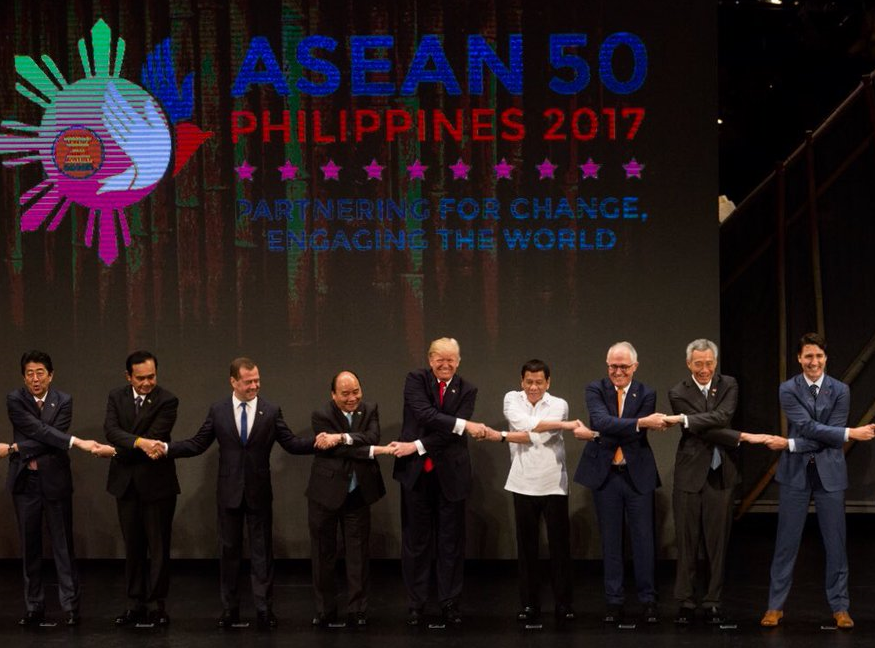Foreign policy white paper 2017: the US isn’t going away
Posted By Tom Switzer on November 28, 2017 @ 14:30

In The crack-up, F. Scott Fitzgerald wrote: ‘The test of a first-rate intelligence is the ability to hold two opposed ideas in mind at the same time, and still retain the ability to function.’ By that standard, several former Australian politicians, diplomats and China policy experts are geniuses. They make two contradictory observations at exactly the same time.
We are told Donald Trump’s America is retreating from the region. But they also warn that Australia shouldn’t sign up to a US-led containment strategy against Beijing. Which is it? Is Uncle Sam pulling up the drawbridge and locking itself out of Asia? Or is it leading a regional coalition to deter a rising China?
Truth be told, the US isn’t withdrawing from the region. History, economics, geography and demographics make the US an Asia–Pacific power: that’s unlikely to change in the Trump era. A government that has done more than any recent US administration to elicit China’s help in curtailing North Korea’s nuclear program is hardly turning tail and running.
True, Trump’s decision to withdraw from the Trans-Pacific Partnership—an Asian trade deal that most Democrats also oppose—was regrettable. But he has backed away from his election pledge to impose punitive tariffs on China. He has also reaffirmed alliances with Japan, South Korea, Australia and the Philippines while calling for a strong US forward-deployed force presence in Asia. So much for the ‘America first’ message of 2016.
Nor is Washington organising a containment strategy against Beijing. Following its immediate predecessor, the Trump administration has yet to determine whether to treat China as a threat to be deterred or as a power to be accommodated.
A Factiva search of ‘quadrilateral security dialogue’ during the president’s recent 12-day trip in Asia is revealing. From 1 to 15 November, the leading Australian titles (the Australian, Australian Financial Review, Sydney Morning Herald) referred to the democratic group in 17 articles, whereas the major US newspapers (the New York Times, Washington Post, Wall Street Journal) made no mention of the informal four-nation strategic dialogue. None. Granted, ‘the quad’ isn’t really part of Washington’s lexicon. Nonetheless, search ‘Australia’, ‘Japan’, ‘India’ and ‘United States’ in the aforementioned publications during Trump’s marathon tour of the region and you’ll find unbalanced coverage: 38 articles (Australia) versus 12 (US). If the administration is bent on turning the quad into an Asian NATO, someone should inform the Washington press corps.
It is against this background that the federal government’s foreign-policy white paper is best understood. As it happens, the authors reflect doubts about Washington’s staying power; and it’s true that US credibility and confidence have waned during the past 15 years, especially in the Middle East. But they don’t subscribe to Hugh White’s counsel [1] that Australia or our neighbours should prepare for the end of US leadership.
In the past decade, both the Coalition and Labor parties have supported intensified military coordination with Washington. Polls show that the Australian public supports those initiatives.
Our leaders have raised doubts before about US staying power in Asia, only to be proved wrong. When the Nixon administration downgraded the US commitment in Vietnam and called on allies to take more responsibility for their security, Prime Minister John Gorton warned: ‘America is going to be less and less interested in this part of the world.’
As it was then, talk of America’s retreat is exaggerated today. The US will remain the world’s most technologically sophisticated economy and predominant military power for the foreseeable future. Its economy is on the cusp of a new stage of massive digital productivity and more robust growth. And as the global trendsetter in innovation, higher education and energy self-sufficiency, the US has the capacity to retain strategic dominance for decades to come.
As for China, just as Paul Dibb and Richard Brabin-Smith [2] do, the white paper authors raise the prospect of ‘friction arising from our different interests, values, and political and legal systems’. That blunt assessment is a welcome contrast to the Pollyanna Gillard government’s 2012 white paper [3], Australia in the Asian century. But their insistence that China’s rise will continue unabated may be misplaced.
For all the euphoria about China’s economic initiatives, such as Xi Jinping’s Belt and Road Initiative, the Communist regime faces great demographic, political and environmental challenges. China has separatists in Tibet and Xinjiang. Christianity is growing in China, whereas Communism—the state religion since 1949—is a discredited faith (which is why the Chinese Communist Party is likely to remake itself as an anti-Western nationalist party). And unlike America, China sits in an implacably tough region surrounded by more than a dozen neighbours, few of which are truly friendly towards Beijing. Just think of the territorial disputes with Vietnam, Japan, the Philippines, India and even Russia.
Keep in mind some history, too. In the past century, China has experienced the collapse of a traditional regime, warlordism, civil war, invasion, revolution, a famine that killed millions, mass terror in the form of the Cultural Revolution and dramatic socioeconomic changes that have led to its fair share of creative destruction. A nation with such a history is likely to prioritise maintaining stability and order at home.
The white paper could have made those points more forcefully. Nonetheless, the authors are right to stress Australia’s interest in maintaining the balance between the US alliance and China trade.
Article printed from The Strategist: https://www.aspistrategist.org.au
URL to article: https://www.aspistrategist.org.au/foreign-policy-white-paper-2017-the-us-isnt-going-away/
URLs in this post:
[1] Hugh White’s counsel: https://www.quarterlyessay.com.au/essay/2017/11/without-america
[2] Paul Dibb and Richard Brabin-Smith: https://www.aspi.org.au/report/australias-management-strategic-risk-new-era
[3] Pollyanna Gillard government’s 2012 white paper: https://www.wsj.com/articles/SB10001424052970204712904578091770985712656
Click here to print.